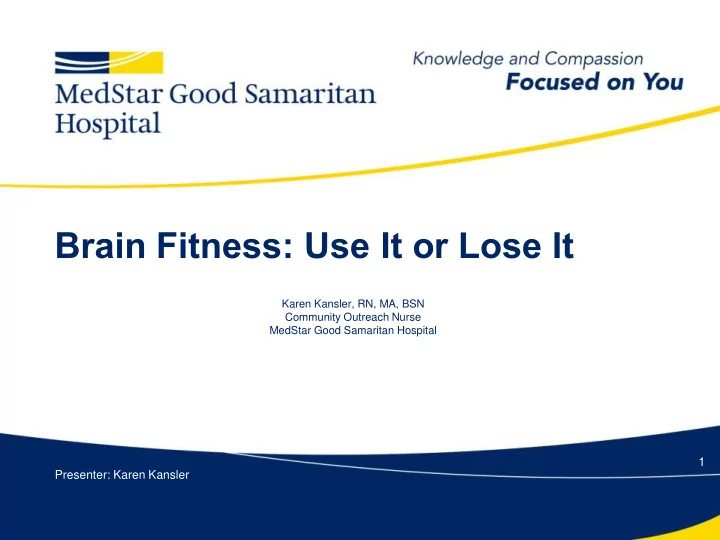

Brain Fitness: Use It or Lose It Karen Kansler, RN, MA, BSN Community Outreach Nurse MedStar Good Samaritan Hospital 1 Presenter: Karen Kansler
Let’s start with a story Mary is a successful stockbroker from Baltimore. She made a lot of money on the stock market. She then met Jack, a handsome young man. She married him and had 3 children. They lived in Chicago. She then stopped working and stayed home to bring up her children. When they were teenagers she went back to work. She and Jack lived happily ever after. 2
Questions • What was her name ? • What did she do for work? • When did she go back to work? • What state did she live in after marriage? 3
Answers • Mary • Stockbroker • When her kids were teenagers • Illinois 4
Today’s Memory Talk • Memory problems, what’s normal vs. what’s not, and when to seek help • Alzheimer’s disease and dementia, symptoms, stages, diagnosis, and resources. • Keeping the brain healthy 5
Normal Age-related Forgetfulness • Occasionally forgetting where you left things you use regularly, such as glasses or keys. • Forgetting names of acquaintances or blocking one memory with a similar one, such as calling a grandson by your son’s name. • Occasionally forgetting an appointment. 6
Normal Age-Related Forgetfulness • Having trouble remembering what you’ve just read, or the details of a conversation. • Walking into a room and forgetting why you entered. Becoming easily distracted. • Not quite being able to retrieve information you have “on the tip of your tongue.” 7
Not So Normal Age-related Forgetfulness • Memory loss that disrupts daily life • Challenges in planning or solving problems • Difficulty completing familiar tasks • Confusion with time or place • Trouble with visual images & spatial relations • New problems with words in speaking/writing • Misplacing things & can’t retrace steps • Decreased or poor judgment • Withdraw from work or social activities • Changes in mood/personality 8
Possible Risks or Threats to Brain Health Some medicines, or improper use of them Smoking Excessive use of alcohol Heart disease, diabetes, and other health problems Poor diet Insufficient sleep Lack of physical activity Little social activity and being alone most of the time 9
Brain Injury Older adults are at higher risk of falling and other accidents that can cause brain injury. How to reduce risk: • Exercise to improve balance and coordination • Take a fall prevention class • Make your home safer • Review medicines and vision with your health care provider • Wear safety belts and helmets • Get enough sleep 10
Dementia • Dementia is a disease marked by a gradual loss of cognitive functioning which can also incorporate losses of muscular, emotional, and social functioning as well. • It is a permanent and progressive disease that eventually renders people unable to care for themselves. 11
Dementia - Causes • 50+ different causes • Vascular disorders such as multi-infarct • Neurological disease (multiple disorders such as strokes) Alzheimer’s (approx. • Inherited disorders 50-70% of people such as Huntington’s with dementia have Alzheimer’s) • Infections such as HIV 12
Alzheimer’s/Dementia - Incidence • About 5 million people in the U.S. suffer from Alzheimer’s disease . – Approx. 5%-8% of people over 65. – As many as 50% over the age of 80 13
Plaques and Tangles Scientists suspect that plaques (clusters of proteins that accumulate between nerve cells) and tangles (protein fibers that develop in dying cells) are main causes for loss of brain tissue and cell deterioration, which leads to Alzheimer’s. 14
Alzheimer’s/Dementia Early Stage • Begins with forgetfulness • Progresses to disorientation and confusion • Personality changes • Symptoms of depression/manic behaviors 15
Alzheimer’s/Dementia - Middle Stage • Poor personal hygiene • Need assistance with • Disturbed sleep ADLs (activities of daily living, such as bathing, • Inability to carry on a eating and dressing) conversation • Unable to remember • May use “word salad” names (sentence fragments) • Loss of short-term recall • Posture may be altered • May display anxious, • Disoriented to time and agitated, delusional, or place obsessive behavior • May ask questions • May be physically or repeatedly verbally aggressive 16
Alzheimer’s/Dementia - Late Stage Characteristics Interventions • Loss of verbal articulation • Caring for physical needs • Loss of ambulation • Maintain integrity of the skin • Bowel and bladder • Medical interventions incontinence • Extended sleep patterns • Most activities are inaccessible • Unresponsive to most stimuli 17
Clock Drawing Test • Draw a clock face, put all the numbers in, and put the time at 2:45 18
Clock Drawing Test 19
Brain Health The six pillars of a brain-healthy lifestyle are: • 1- Regular exercise • 2- Healthy diet • 3- Mental stimulation • 4- Quality sleep • 5- Stress management • 6- An active social life 20
Brain fitness - A Daily Plan • Scan a newspaper • Watch/listen to the morning news • Do weekly crossword/Sudoku puzzle — try something new often • Play a video/card/board game • Communicate with another person • LAUGH every day! : ) • EXERCISE every day! (aerobics, dance, yoga, tai chi, etc.) • Listen to music 21
Take a FREE Memory Assessment • Test your brain health and take our free online memory assessment to find out if you need to see a geriatric specialist for your memory. Visit MedStarHealth.org/Memory to learn more. 22
More Information Center for Successful Aging at MedStar Good Samaritan Hospital: Learn about dementia symptoms and memory loss. Community Programs: • Contact a local Area Agency on Aging (AAA) • Contact a local Aging & Disability Resource Center (ADRC) • Or, go to http://eldercare.gov/ Alzheimer’s Association: www.alz.org Alzheimer Foundation of American: www.alzfdn.org National Institutes of Health: http://nih.gov National Institute on Aging at NIH: http://nia.nih.gov ClinicalTrials.gov, a service of NIH: http://clinicaltrials.gov Centers for Disease Control and Prevention: • http://www.cdc.gov/aging 23 • http://www.cdc.gov/physicalactivity
Recommend
More recommend